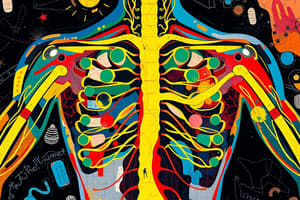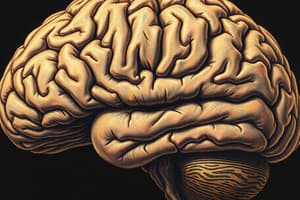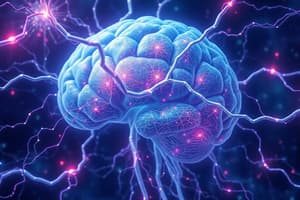Podcast
Questions and Answers
Afferent nerves are also called:
Afferent nerves are also called:
- Neurons
- Sensory nerves (correct)
- Motor nerves
- Interneurons
Efferent nerves are also called:
Efferent nerves are also called:
- Axons
- Motor nerves (correct)
- Sensory nerves
- Interneurons
What are the nerve cells that connect efferent and afferent nerve cells?
What are the nerve cells that connect efferent and afferent nerve cells?
Interneurons
The basic unit of the nervous system is the nerve cell, or:
The basic unit of the nervous system is the nerve cell, or:
The long extension of nerve fiber that conducts the impulse away from the nerve cell body is a(n):
The long extension of nerve fiber that conducts the impulse away from the nerve cell body is a(n):
The covering of the axon is the:
The covering of the axon is the:
What are the chemicals that help nerve cells communicate with other nerve cells or muscles?
What are the chemicals that help nerve cells communicate with other nerve cells or muscles?
What structure slows the passage or prevents some drugs and disease-causing organisms from entering the CNS?
What structure slows the passage or prevents some drugs and disease-causing organisms from entering the CNS?
The grooves or depressions on the surface of the brain are:
The grooves or depressions on the surface of the brain are:
The folds or convolutions on the surface of the cerebral hemisphere that increase the gray matter surface area are:
The folds or convolutions on the surface of the cerebral hemisphere that increase the gray matter surface area are:
The term for the skin surface supplied by a single afferent nerve is:
The term for the skin surface supplied by a single afferent nerve is:
Memory loss is called:
Memory loss is called:
A sensation that precedes an epileptic seizure or the onset of some types of headache is a(n):
A sensation that precedes an epileptic seizure or the onset of some types of headache is a(n):
The condition that denotes difficulty swallowing is:
The condition that denotes difficulty swallowing is:
A feeling of prickling, burning, or numbness is:
A feeling of prickling, burning, or numbness is:
Poor balance and coordination is:
Poor balance and coordination is:
Dizziness is:
Dizziness is:
What is a sudden increase of electrical activity in one or more parts of the brain, also called convulsions?
What is a sudden increase of electrical activity in one or more parts of the brain, also called convulsions?
The most serious type of spina bifida, causing partial or complete paralysis below the opening, is:
The most serious type of spina bifida, causing partial or complete paralysis below the opening, is:
A condition of abnormal accumulation of cerebrospinal fluid that causes enlargement of the skull and compression of the brain is:
A condition of abnormal accumulation of cerebrospinal fluid that causes enlargement of the skull and compression of the brain is:
Flashcards are hidden until you start studying
Study Notes
Nervous System Components
- Afferent nerves, also known as sensory nerves, transmit sensory information to the central nervous system (CNS).
- Efferent nerves, or motor nerves, carry signals away from the CNS to initiate muscle movement.
Neuron Structure
- Interneurons serve as connectors between afferent and efferent nerve cells, facilitating communication within the nervous system.
- The basic unit of the nervous system is the neuron, which transmits information throughout the body.
- Axons are long fiber extensions of neurons that conduct impulses away from the cell body.
- Myelin sheaths are coverings that insulate axons, enhancing impulse transmission speed.
Communication in the Nervous System
- Neurotransmitters are chemical messengers that enable communication between nerve cells and muscles.
Protection of the CNS
- The blood-brain barrier (BBB) is a selective permeability barrier that protects the CNS from harmful substances and pathogens.
Brain Surface Structures
- Sulci are grooves or indentations on the brain's surface, contributing to its complexity.
- Gyri are the raised folds on the cerebral hemisphere's surface, which increase the area of gray matter and enhance processing capacity.
Sensory and Cognitive Terms
- A dermatome refers to the specific skin region innervated by a single afferent nerve.
- Amnesia denotes memory loss, which can impact daily functioning and cognitive abilities.
- An aura is a sensory phenomenon that can precede seizures or certain headaches, often serving as a warning sign.
Neurological Conditions
- Dysphagia is a condition marked by difficulty in swallowing, which can impact nutrition and health.
- Paresthesia describes abnormal sensations such as prickling, burning, or numbness, indicating nerve dysfunction.
- Ataxia refers to poor balance and coordination, affecting movement and stability.
- Vertigo is a type of dizziness often associated with a sense of spinning, impacting one’s balance.
Seizures and Related Conditions
- Seizures are sudden increases in electrical activity in the brain, also referred to as convulsions.
- Myelomeningocele is the most severe form of spina bifida, potentially leading to paralysis below the affected area.
- Hydrocephalus is characterized by an abnormal buildup of cerebrospinal fluid in the brain, causing brain swelling and increased intracranial pressure.
Studying That Suits You
Use AI to generate personalized quizzes and flashcards to suit your learning preferences.




